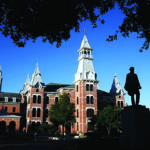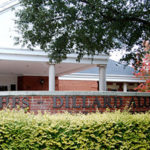WACO—Baylor University may unify its alumni-engagement program, and alumni may retain the Baylor Line magazine as an independent voice under terms of an agreement reached by a negotiating team representing the university and the Baylor Alumni Association.
The 154-year-old Baylor Alumni Association—which has operated 35 years outside university control—would dissolve if its members agree to ratify the proposal at a called meeting Sept. 7.
 In its place, a new independent, self-supporting nonprofit corporation would be created to publish the Baylor Line magazine, an email newsletter and social media. The proposal requires two-thirds approval at the alumni association meeting.
In its place, a new independent, self-supporting nonprofit corporation would be created to publish the Baylor Line magazine, an email newsletter and social media. The proposal requires two-thirds approval at the alumni association meeting.
The relationship between the independent alumni association and the university became strained about 10 years ago. The Baylor Line at that time took positions critical of the school’s administration and board of regents. The university developed its own alumni services office—the Baylor Alumni Network—and began publishing its own magazine for alumni and donors.
In 2009, Baylor presented the alumni association a proposal asking the group to give up its independent status and come under the authority of the university administration. However, Baylor withdrew that proposal about six weeks later, citing what it perceived as the alumni association’s lack of positive response.
10-month negotiation
In contrast, the latest proposal grew out of 10 months of negotiations and received the unanimous support of the university’s board of regents and the alumni association’s executive board, Baylor President Ken Starr reported in a letter to the “Baylor Nation.”
Three Baylor University regents from Dallas represented the university on the negotiating team—Chairman Richard Willis, president and chief executive officer of Navarre Corporation; Joel Allison, president and CEO of Baylor Health Care System; and Ron Murff, a business consultant and past regents chair.
Three Baylor Alumni Association board leaders participated in the negotiations—Elizabeth Coker, a district court judge from Livingston and past president of the association; Si Ragsdale of Childress, former secretary and now president-elect of the association; and Kyle Gilley of Sioux Falls, S.D., at-large board representative and now board secretary. Collin Cox, a Houston attorney, became involved in the latter stages of negotiations before he assumed office as president of the alumni association.
Sign up for our weekly edition and get all our headlines in your inbox on Thursdays
 “With the help of all Baylor alumni, including those who have faithfully supported the Baylor Alumni Association, our university is poised to build a single, comprehensive, nationally focused and university-based alumni outreach program,” Starr said. “This important development embodies an essential step in the maturation of the university’s array of services and programs for Baylor alumni.”
“With the help of all Baylor alumni, including those who have faithfully supported the Baylor Alumni Association, our university is poised to build a single, comprehensive, nationally focused and university-based alumni outreach program,” Starr said. “This important development embodies an essential step in the maturation of the university’s array of services and programs for Baylor alumni.”
Last year, the university-sponsored Baylor Alumni Network held about 850 events in 150 locations worldwide that involved more than 35,000 alumni and supporters, Starr noted.
The Baptist Standard requested a comment from the Baylor board of regents chair, but he chose to let Starr speak on behalf of the university and its governing board.
Resolves past disagreements
The negotiations represented “extended discussions about a path forward that would resolve past disagreements and unify the Baylor family,” Cox wrote in a letter to members of the Baylor Alumni Association.
“Change can be difficult, but your executive committee believes this is the best course of action for the BAA. We have consistently reaffirmed the core principle of alumni independence for the university we all love. We now have the opportunity to solidify that independence, while simultaneously contributing meaningfully to a fully cohesive set of alumni programs that will help bring Baylor President Ken Starr’s vision of Baylor alumni outreach to reality.”
In an interview, Cox characterized negotiations as “lengthy, spirited, conducted in good faith,” “full of compromises” and “a healthy process.”
“The most important point for us was to preserve the independent voice that the Baylor Line represents,” he said.
Creates advisory board
The proposal includes a provision that creates the Baylor Alumni Advisory Board to work with the university’s alumni engagement programs. Directors of the Baylor Alumni Association will be able to choose to serve on the advisory board, on the board for the Baylor Line Corporation or in neither capacity, Cox explained.
Baylor Alumni Association staff will have the option to become Baylor University employees with associated benefits. The Baylor Line Corporation will pay all salaries and benefits for its staff.
Jeff Kilgore, executive vice president and chief executive officer of the Baylor Alumni Association, already had agreed to join the Texas State Technical College system as vice chancellor later this summer, Cox noted.
Donations to the Baylor Alumni Association for student scholarships will be transferred to the university for distribution, and gifts intended by donors to support “an independent voice” will be transferred to the Baylor Line Corporation, Cox added.
Move from alumni center
One change regarding the alumni association and university will occur within the next few weeks. Baylor’s plans for its new football stadium call for a pedestrian bridge to be built, beginning where the Hughes-Dillard Alumni Center is located. The university owns both the land and the building, but it has granted the alumni association the right to occupy it unless it needs the land.
Since the building will need to be demolished this summer for stadium construction to stay on schedule, the Baylor Alumni Association will relocate by July 3 to temporary facilities in Robinson Tower.
Baylor will pay for the temporary move and—pending approval in September—will pay for the Baylor Line Corporation to move into permanent facilities in the same facility as the university’s vice president for communications.
“As with other significant campus construction and expansion projects, we will take every measure to preserve, relocate or recreate the symbols of honor and recognition currently located at Hughes-Dillard,” Starr said.














We seek to connect God’s story and God’s people around the world. To learn more about God’s story, click here.
Send comments and feedback to Eric Black, our editor. For comments to be published, please specify “letter to the editor.” Maximum length for publication is 300 words.